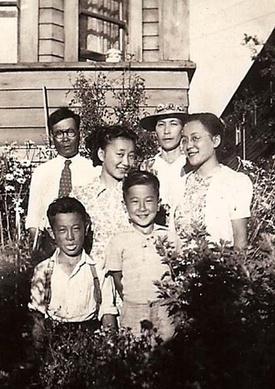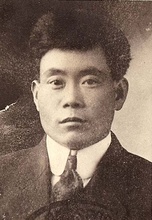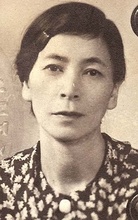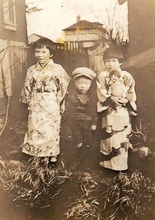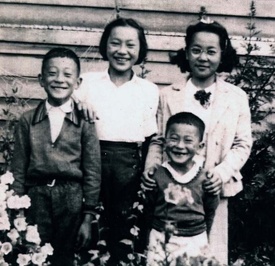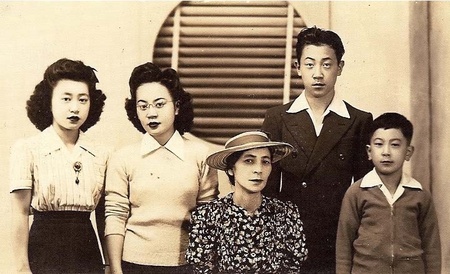As the 75th anniversary of the internment came and went last year, I have promised myself to get more of the stories of the Nisei recorded in 2018 while I can.
As serendipity would have it, I met Nisei Masayoshi “Mush” (Allan) Arima, 86, at a 75th internment anniversary luncheon at the Momiji retirement home in Toronto last fall. He was hanging out, reading some of the displays and I started up a casual conversation asking about where he was interned. He asked about me too and made some nice comments about reading my work when I was living in Japan in the Nikkei Voice newspaper.
I promised to follow up our nice little conversation with an interview and a promise is a promise so here it goes….
Mush wrote the following preface:
The writings here are from the memories and perspective of a 10-11-12-13 year-old boy recalling a time when life was an unforgettable adventure with new experiences happening almost every day. Recalling the train ride for the first time, snow, ice skating, skiing, fishing, new friends, swimming in Slocan Lake which was unspoiled by pollution—crystal clear, unlike the Fraser River in Marpole—life was an amazing time, but for my mother, a widow at the time, it was the extreme opposite. Having 4 children to look after without a father, the upheaval from our home, the horrible experience for her in Hastings Park, and the internment was an exhausting, demoralizing nightmare for her—in my mind, eventually costing her life.
Some of the other memories and incidents my sister Takako helped me fill in the blanks.
Being 2018 and 76 years after internment now, what can you tell us about it “feels” like to be a Nisei who went through all of what you did?
With our Nisei generation aging and many having passed away, the history of our wartime experience must never be forgotten nor the effort to understand how and why the human rights of the Japanese Canadians were violated. The courage and determination of all Japanese Canadian people remained strong during this terrible and unprecedented period in their lives.
Can you please go into some detail about your own family’s history about where the Arimas are from in Japan? Where you were living in BC before WW2? What do you remember about life back then?
My father Itaro was born in Kagawa prefecture, Japan in 1888 and died October 1939.
Mother Same (nee Ishikawa) was born in Shimane prefecture in 1897 and died August 1944. They were married in Japan in May 1919 and emigrated to Canada in May 1921. Do not know where they resided when they arrived in Canada. Very little information about his or her life before emigrating to Canada, due to their early deaths and communication problems (language).
I have three siblings—sister Takako, born 1922, sister Toshiko, born 1923, and brother Yoshifumi born 1927. I was born in 1931. We were all born in Marpole, BC, delivered by a midwife, Mrs Watanabe, a lady of considerable fame amongst the Japanese community. She delivered many of the Japanese Canadian kids born in the thirties and forties. Our family resided in Marpole, BC, a suburb of Vancouver at that time, where approximately 50 to 60 Japanese families lived in and around the same area.
Life for a young kid during the thirties and forties was carefree. I did not have any hakujin (white) friends. All my friends were Japanese kids from the neighbourhood. My day usually consisted of going to public school, coming home for lunch, and attending Japanese Language School after school three days a week at the Japanese Community Hall. The hall was also used for Japaese Kindergarten classes, Sunday Buddhist Church, and martial arts classes in the evenings (in the last few years it was moved to another location in Marpole, used as a Learning Centre).
Our family like many of the other Japanese families in the neighbourhood were poor with few luxuries, but we all managed to be clothed and fed. Life was extremely difficult for our fathers and mothers, since they did not speak English and had very few skills for finding work to support the family.
Father worked at Eburne Sawmill (BC Box) as a labourer with other Japanese men. In October 1939, he died in a logging accident. He was 51 years old. Mom stayed home doing housework. Both sisters in their teens worked as "house girls" for different hakujin families after school to support the family. They stayed at their homes during the week and came home on the weekends. Each were paid $5 a month.
I attended David Lloyd George Public School up to grade 4. My sisters Takako and Toshiko both attended and graduated from Magee High School. Brother Yoshifumi attended Point Grey Junior High until the war started and never graduated.
In early 1942, all the Japanese Canadian kids at the school were summoned to the principal's office. He told us that we were dismissed and would not be allowed to return. No explanation by the principal. Confused, we didn't really understand why only the Japanese Canadian kids were singled out. What did we do? (not understanding there was a war going on and Japan was the enemy)… but I thought we were the same as the other kids! He said he hoped to see us when the war was over. I still remember a white girl calling me a ‘Jap’ in class, but didn't really think too much of it.
Where exactly were you living at the time of internment? What do you recall about how your siblings and parents reacted to the government’s decision to take away your property and put you into a concentration camp?
Our family was living in Marpole at the time of the (federal) government order to move out within a few days. The most distressful part for mother and sisters was the uncertainty, not knowing where we are going to live. What do we do with the contents in the house?
For me, I felt confusion because I didn't understand "why" – I was only 10 years old.
Today, what do your conversations about internment sound like with your siblings around the dinner table?
I freely discussed my experiences in the ghost town with my kids at an early stage in their lives and they are fully aware of what happened during those times. How and why did this happen, was there no one or group protesting the treatment of Japanese Canadians?
How much of a part of your own kids’ upbringing was “internment” and your experience as Japanese Canadians?
I talk to my sons, and grandchildren. I am always open to speaking about my experience of the internment and discuss if they have questions.
It was a period in time that few other kids (outside of Japanese kids) would have experienced in their lives and I enjoy taking part in any discussions about the internment with anyone.
Do you talk about it with your grandkids?
Yes, as mentioned, I did speak on 2 occasions at their classrooms because of the grandkids interest at that time in their lives about our incarceration during the war. On occasion, we still do talk about it when and if they have questions.
What do you remember about life in Hastings Park?
Hastings Park (Pacific National Exhibition site) the Annual Fair and Amusement Park in Vancouver where we visited every year before school began in the fall. A place where we enjoyed the midway rides, the games, the food, and exhibits.
In an ironic twist, this amusement park became our 'prison' and the start of our incarceration. The park was enclosed with high wire fences surrounding it with guards (Mounties) stationed at the front gate. The women and children were housed in the Livestock Building. My brother at age 15 was separated from the family and sent to the Men's Dormitory in another part of the park.
Animal stalls used during the fair were our living quarters. The terrible stench and the filth from the animal urine and shit remains with me to this day, no amount of cleaning could erase that odour. It was just awful. Something I never forgot.
We had bunk beds with a sheet to cover the front for some privacy. The toilet was some kind of trough with water flowing from one end to another behind the stalls. The food was awful. Just a terrible time for all of us.
For fun we kids would roam the building looking for something to do, it was another adventure.
I remember there was a golf course outside the building and when the hakujin golfers hit the ball over the fence, we wouldn't return the ball and they would holler, "Give it back, you Japs..."
Our family was in Hastings Park for about 3 to 4 months, before being shipped out to the interior of BC – Slocan City.
© 2018 Norm Ibuki


